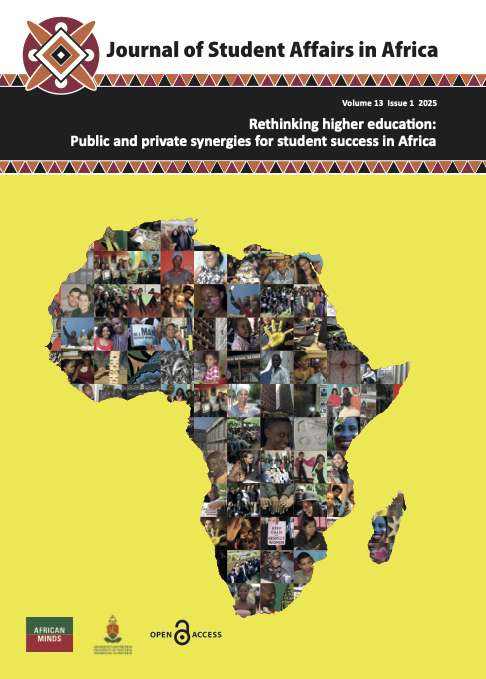The role of residence advisors in student academic advice and success: insights and experiences from a university of technology
DOI:
https://doi.org/10.24085/jsaa.v13i1.4872Keywords:
Student housing, academic advising, resident's advisorAbstract
Student achievement is a central objective for higher education institutions. To advance this goal, continuous enhancements in academic support services and interventions have been introduced within Higher Education Institutions (HEIs). Initiatives like academic advice, increasingly emphasize an interconnected approach, acknowledging the significant impact of out-of-class learning environments on student accomplishments. The out-of-class learning environment encompasses various components that include study spaces, recreational facilities, and student housing accommodation. However, limited research on the connectedness between student housing, academic advising and student success exists. Informed by the basic tenets of the validation theory, this study sought to explore the impact of student housing on academic advice and student success with a specific focus on the contributions of Residence Advisors (RAs). Thirteen [N=13], Residence Advisors [RAs] from Durban University of Technology responded to an online open-ended questionnaire administered through Google Forms. Data indicated that RAs functioned as a primary point of contact for students experiencing problems affecting their academic work. A vital role offering academic guidance and counselling significantly influencing the academic progress of students residing at respective facilities was performed by the advisors. However, the RAs had received minimal or no formal training on the provision academic advice. The study recommends that RAs get training on academic advising for improved efficacy of their critical role on student attainment.
Downloads
Published
Issue
Section
License
Copyright (c) 2025 Isheachida Manatsa, Mzwandile

This work is licensed under a Creative Commons Attribution-NonCommercial-ShareAlike 4.0 International License.
Authors who publish with this journal agree to the following terms:
Authors retain copyright and grant the journal right of first publication with the work simultaneously licensed under the Creative Commons Attribution Share-alike 4.0 International License that allows others to share the work with an acknowledgement of the work's authorship and initial publication in this journal.
Authors are able to enter into separate, additional contractual arrangements for the non-exclusive distribution of the journal's published version of the work (e.g., post it to an institutional repository or publish it in a book), with an acknowledgement of its initial publication in this journal.
Authors are permitted and encouraged to post their work online (e.g., in institutional repositories or on their website) prior to and during the submission process, as it can lead to productive exchanges, as well as earlier and greater citation of published work (See: The Effect of Open Access).


